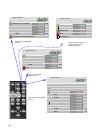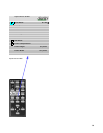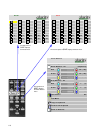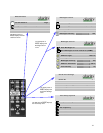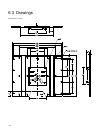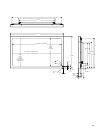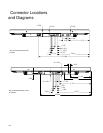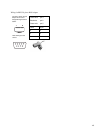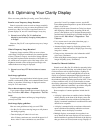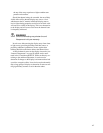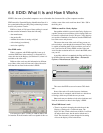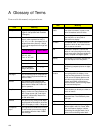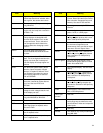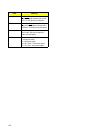116
6.5 Optimizing Your Clarity Display
Here are some guidelines for using your Clarity display.
Burn In versus Temporary Image Retention
Burn-in causes the screen to retain an image essentially
forever, with little or no way to correct the problem. Under
normal use, a Bay Cat X will not experience burn-in, as
plasma displays do, nor will it retain images in any way.
✎ Normal use of a Bay Cat X is defined as
displaying continuously changing video patterns
or images.
However, Bay Cat X’s can experience temporary image
retention.
What is Temporary Image Retention?
Temporary image retention (TIR) can occur when a
static image is displayed continuously for extended periods
of time (12 hours or longer). An electrical charge differen-
tial may build up between the electrodes of the liquid crys-
tal, which causes a negative-color video image (color- and
brightness-inverted version of the previous image) to be
retained when a new image is displayed.
✎ Normal use of any LCD device does not cause
TIR.
Static image applications
Typical static image applications include airports, transit
stations, stock markets, banks, and command/control instal-
lations, or anywhere a fixed image is displayed continu-
ously for 12 or more hours.
How to detect temporary image retention
If you suspect image retention has occurred, display the
Gray Test Pattern (Main Menu > Diagnostics > Test Pat-
terns).
If anything other than a uniform gray image displays,
you may have TIR.
Static image display guidelines
Here are some guidelines to help you avoid TIR:
• Use Bay Cat X to show moving images or still pictures
that change regularly
• Turn the display off when it is not in use
After 24 hours continuous use, turn off the power for 2
hours. After 12 hours continuous use, turn off the
power for 1 hour. For computer sources, use the PC
Power Management Properties to power off the monitor
when it is not in use.
• Display a black screen. Research at Clarity has shown
that displaying a black image, or turning off the AC
power, is the quickest way to dissipate the temporarily
retained image (a black image is available from the Test
Patterns menu: Main Menu > Diagnostics > Test
Patterns)
• Use a screen saver in one color (other than grey), a
moving image, or random images
• Alternate display images by displaying primary infor-
mation for 1 hour followed by a display logo or moving
image for 1 minute
• Change colors: alternate the color information with 2
colors every 30 minutes.
• When using high-contrast images, reposition the
images frequently (every 30 minutes).
Normal Use Thermal Guidelines
Normal use of a Bay Cat X is defined as operating in the
open air to prevent heat buildup, and without direct or indi-
rect heat sources such as adjacent displays, lighting fix-
tures, heating ducts, or direct sunlight that can cause the
display to experience temperatures higher than the maxi-
mum ambient operating specification of 35ºC, nor below
the minimum ambient operating specification of 0ºC. If one
of these conditions exist, it is up to the installer to ensure
that display placement is changed, thermal shielding is pro-
vided and/or additional ventilation is provided to keep the
display within its nominal operating parameters.
Some examples of common problems include the fol-
lowing:
• A display is placed near an outside window. Sunlight
shining directly on the front of the display causes the
unit to overheat from solar radiation even though the
display is mounted in ambient air conditions that would
otherwise be acceptable.
• A display is mounted inside an enclosure without ade-
quate ventilation. Heat buildup within the enclosure
eventually causes the display to overheat
• Multiple displays are mounted close together in an
array. Heat from the lower displays rises and creates a
thermal ambient air gradient on the back of the displays
that goes from cool to hot (bottom to top). Displays at



